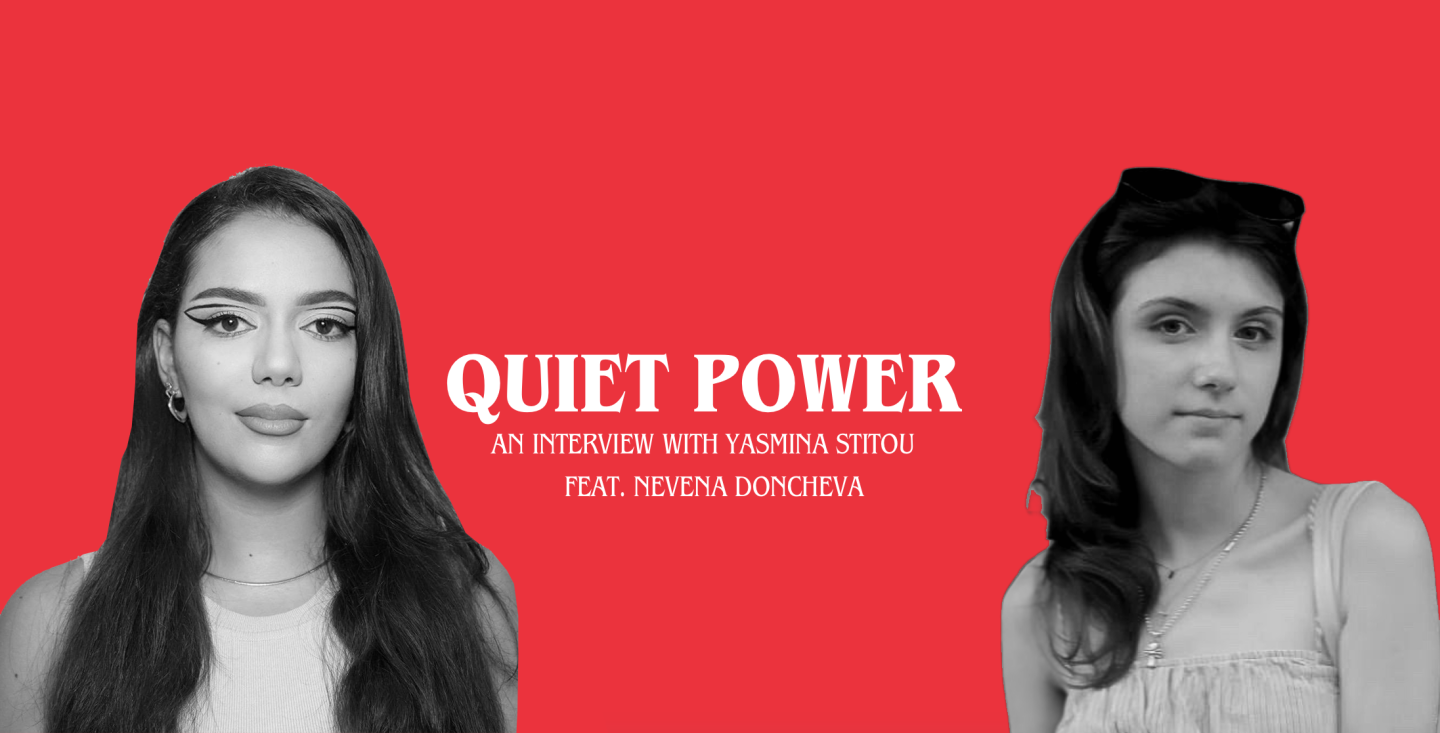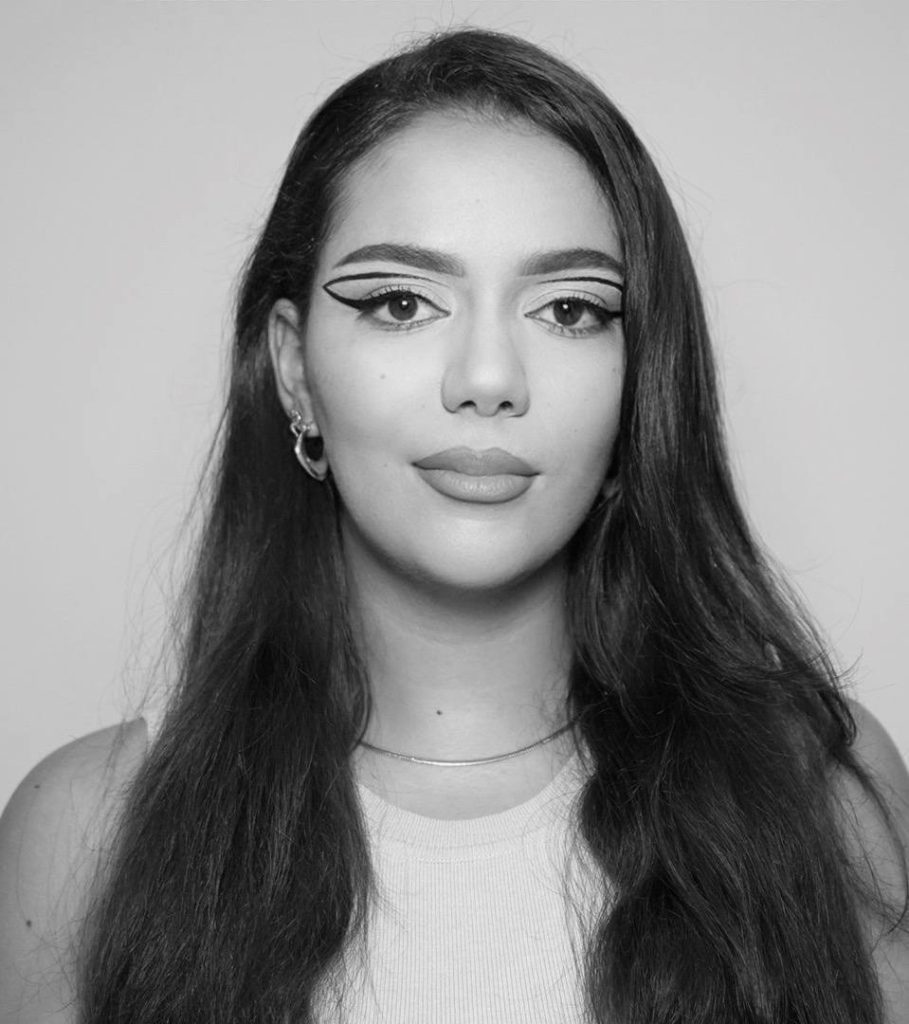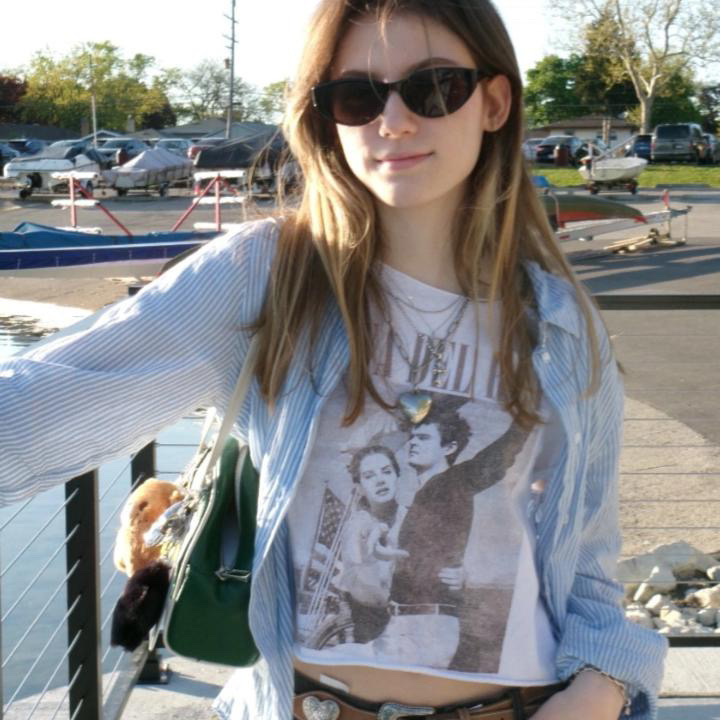
Culture Is the Strategy: Inside the Mind of Yasmina Stitou
One early morning, Yasmina Stitou — a multi-hyphenate creative strategist and founder of Casanegra — sits down to talk about all things branding, culture, identity, and the truth behind what really connects us. With a blurred background, the focus falls on her beautifully waved blonde streaks and pristine appearance. Demeanor relaxed yet sophisticated she holds herself with quiet confidence.
[Nevena] What is a fun fact that not a lot of people know about you?
[Yasmina] A lot of people might assume I’m just a marketer. I’m really not – KPIs give me the worst chills. My goal is to make brands understand their audiences and engage emotionally with them. As a strategist, one has to have an unquenchable thirst for knowledge and a deep, child-like sense of curiosity. I can’t put down my nerd glasses!
Everything is a reflection, a perspective, a fresh insight. I am fascinated by human behavior, sociology, the psyche, and ancient practices. I’m currently studying Tibetan Buddhism and diving deep into Jungian psychology because how we behave, think and feel helps me find a deeper understanding into how to communicate with different human beings with different dreams and lived experiences. It also helps me build better relationships with others and myself.
[Nevena] Building onto that, what is the latest piece of media that you consumed that intrigued you? Whether it be like movies, like books, or like just any sort of information you’ve taken in.
[Yasmina] I’m gonna be dead honest. My background is blurred, but as you can see, I’m watching the Kardashians. I love, love, love, love reality tv – for entertainment purposes, yes, but it’s also something that has supported me greatly in building brands is watching a lot of reality TV and instantly see what works, what doesn’t, how they shift perception, how they communicate, and how the media training looks like. Culture is being defined by key players like these as we speak, so I can’t ignore them.

Yasmina Stitou is an award-winning publicist and cultural strategist with nearly a decade of experience building cult brands and cutting-edge strategies. With deep expertise spanning brand strategy, public relations, and trend analysis, she is the founder of CASANEGRA, an AI-powered strategy and communications consultancy that helps brands play not just in the market, but in culture. One early morning, she sits down to talk about all things culture, chaos, and communications strategy—and why chasing trends without purpose is just noise.
[Nevena] Let’s start with your brand. What are three words you would use to define CASANEGRA?
[Yasmina] I would definitely say human, radical and resonant.
[Nevena] Could you elaborate?
[Yasmina] Of course.CASANEGRA is an AI-powered consultancy, so the instinctive reaction might be, “Wait, how is that human?” But that’s exactly the point: we use AI to decode culture, analyze community behavior, and understand people on a deeper level. The tech is just a tool. The goal is to help brands feel less robotic and more alive, intuitive, and human. It’s resonant because we don’t do surface-level branding. We build emotional, cultural relevance—brands people actually see themselves in, and want to belong to. We have seen it in brands like Patagonia or Nike.
And it’s radical in the sense that we don’t follow outdated marketing playbooks. Traditional ads just don’t land the way they used to. Audiences are too smart, too saturated. Casanegra takes a culture-first approach that cuts through the noise and creates meaning. It’s a more elevated, intentional kind of strategy that meets people where they are, without shouting or overselling. It’s the only way brands need to operate if they want to survive in the next decade.
[Nevena] That’s a refreshing perspective. So, what initially sparked your passion for building CASANEGRA? What made you pursue building a PR focused brand based on strategy and not just like numbers and data?
[Yasmina] I was tired of the smoke and mirrors. Tired of strategies that treated people like they’re stupid or predictable. That approach is completely obsolete, it doesn’t work! We buy from emotion, identity, subconscious pull. You can’t do that with memes with the objective of reaching Gen Zers. Actually, it’s quite the opposite. When Gen Z perceives that brands try to be relatable to them artificially, they hate it. It’s a tangible tacky-ness. Most people don’t think or care about brands on a daily basis. The only way through is emotion. Every purchase is a statement that one is a part of a crew, a community, this micro-niche or that algorithm, and so on.
[Nevena] Building off of that— do you think brands that create a “vibe” are more successful with Gen Z?
[Yasmina] I would say yes, but only if they have a very in-depth brand strategy. It’s not enough to have a curated interest board of aesthetic visuals – because I’ve seen those brands that spend thousands on creative direction photo shoots, and the feed is beautiful, but they’re not selling because they’re not telling me anything. Actually, what it says underneath, in the caption, matters a lot more than whatever visual that you might produce.
[Nevena] Switching gears a bit— what are some challenges that emerged when it came to growing your brand?
[Yasmina] Oh, for me, not playing the visibility game. It’s hard to build a global presence when you’re not constantly posting with the rocket emojis on LinkedIn or you’re not in Cannes Lions sipping cocktails with 3000 other so-called “creative directors” under the age of 25. So the biggest challenge was definitely staying true to ourselves and not falling into the LinkedIn performance trap of pretending to be better. That’s how humans burn out. I decided I’d rather build something real than keep enabling what wasn’t working. I prefer to let the work spear for itself and stay grounded in honesty.
[Nevena] Speaking of trends and algorithms, there’s one specific trend that’s been puzzling people lately — Labubus.
[Yasmina] What, sorry? Labubus?
[Nevena] Like those bunny keychains…
[Yasmina] Yes, yes, yes. I’ve seen that on TikTok!
[Nevena] Yeah. Do you know, do you have a guess, perhaps like some kind of explanation or like, would you like to find a reason why they’re so popular?
[Yasmina] I truly don’t think I’m the target audience for a Labubu— but I know a lot of people are really hyped about them. Let me say this about algorithms and micro trends. You probably have friends that send you TikToks and say, “oh my gosh, this is literally me.” It’s called Barnum effect – we have a feeling or bias that our traits and personality are somewhat unique to us, but our algorithm— especially the TikTok one— knows us so well that it will give us exactly what we want and reflect that idea, taste, or trend right back to us.
So when things like this, like the Labubu, become popular, it does seem like they are insanely popular— which they are — but they are insanely popular within a very specific algorithm. Not a demographic, but an algorithm. It’s not representative of a global sample.
[Nevena] Yeah, that’s actually kind of interesting ’cause I have two TikTok accounts. One of them is like my private account and one of them is my public account. And those pages are so completely different from one another. And it’s like, oh, so I’m on this side, on this part and then I’m on the other side.
[Yasmina] Yes. And that’s why people say, “oh, commenting to stay on the cat side of TikTok” or “I’m commenting to stay on the meme side of TikTok,” whatever niche that may be. People are aware, but not really of how perfectly created and tailored your feed is to you.
[Nevena] Since we are on the topic of algorithms, I’m curious — do you think generative AI can become a replacement for human strategy? And if so, in what ways is it better? What is your perspective on the rise of gen AI in creative fields?
[Yasmina] Absolutely not. Strategy work is impossible to replicate through artificial intelligence by definition. I actually just hosted a panel at a startup conference on this. Because people were asking if they can substitute entire communications or strategy teams with ChatGPT–and it’s just like, no. You can do a little communications schedule, you can do other things that are more mechanical if you lack the budget allocation for talent.
[Yasmina] And as I said, at Casanegra— I work our own AI algorithms on a daily basis. Research is a huge part of building strategies. However, AI is just great for matching patterns, identifying patterns, summarizing research, pulling the threads, connecting, so we might go “Oh, there’s a niche of people in the south of France that do this, but also in the north of Italy.”
[Yasmina] But strategy is first, the study of human behavior. AI will give you the ingredients to the cake, but you still have to go out and make the cake yourself. It’s like the supermarket. The cashier scans your stuff but they are not going to make the cake for you. It will give you all that you need, all the fat chunk of data, the patterns, even some frameworking, but the actual work has to be done by a human – because we are the ones that have a lived experience. We go out, have friends, fall in love, go for drinks, travel, cry, laugh. You can’t replace conscious, lived experience with an algorithm.
AI is a wonderful tool. It has streamlined processes that took months before. I think whoever chooses to not use AI is gonna fall behind. I wish it could be different, but tech takes on a life of its own. It’s just like with the creation of smartphones, social media and data services. You could choose to not have a smartphone, but then you’d struggle a great deal even with making bank payments. The system is set up for 24/7 connectedness.
[Nevena] True. And I’ve seen some cities digitize everything like currency, even like people just use their digital cards instead of physical cash and I agree on that approach, but I feel like it makes us really dependent on our phones to an extent — ’cause without our phones, you’re basically just done.
[Yasmina] You can’t really do anything. You can’t do your taxes, you can’t manage your bank payments, you can’t keep up with your friends and their lives. It’s also sad and a bit nostalgic that there’s no habit to phone call out of the blue anymore. I remember when I was in high school – we had no phones and we had no internet service, which was really nice. I remember I used to come home and if I wanted to talk to my friend, I had to grab the landline phone and be like, “Hi Jenny’s mom, is Jenny home?” that was the only way to reach my friend. Now I have over 80 unopened chats on WhatsApp plus a number on Instagram DMs sitting there in my notifications. It’s very different. Kind of overwhelming.
Yeah, very different but I think it’s better. Because as a high schooler, I’ve seen the effects of phone usage at school, and it’s really sad to see people can’t go a day without using AI or even using their phone. They get frustrated when their phones get taken.
[Yasmina] No, it’s horrible. And I see the effects of that in our mental health. I mean, if this new tech ecosystem is already affecting me – somebody that grew up without a smartphone – I can’t even imagine now with younger Gen Z. They are really damaged from the exposure to the internet in a phase of their lives when they shouldn’t have had access.
[Nevena] it’s really interesting, I’ve heard that our attention spans are really fried beyond repair and it’s 0.8 seconds.
[Yasmina] Right now, it’s only 0.8. It’s not even a second.
[Nevena] It’s less by the minute. I relate unfortunately to that. Like I find myself checking my phone every two minutes. I’m like, where’s my phone? I can’t find it.
[Yasmina] That’s just how it is now, a daily struggle with our dopamine receptors. That’s why understanding neuroscience is important. I am doing a 15-minute no stimuli session every day. I sit for 15 minutes and I don’t have access to any books, phone, TV, or anything engaging. It’s not meditation either – I just sit and stare. It re-conditions our amygdala to know that a lack of a stimulus does not equal the presence of a danger.
[Nevena] I think personally for me, my summer period is my detox period.
[Nevena] With everything you’ve accomplished as a founder, publicist and strategist, are there any female leaders that inspired you?
[Yasmina] Well, before founder and publicist, I’m the eldest daughter of an immigrant family. I think that’s an accomplishment in itself, haha.
[Nevena] I am too, an only child, though.
[Yasmina] I think it can be quite similar to being an eldest daughter because you carry a lot of responsibilities and you grow up way earlier than you should – which comes with a set of challenges and neurological conditioners. That’s why we have to reconcile with our inner child!
When it comes to female leaders, I really love the work of Naila, a Lebanese speaker/skydiver who survived a set of really awful life challenges. She went on to become a TEDX speaker and influencer. I also want to mention the life-changing work of my dear friend and podcaster Mollie Adler. She hosts Back From The Borderline, one of the top podcasts globally in spirituality and wellness. Her work has greatly impacted me and how I understand the world.
[Yasmina] I will admire someone for their work. Yes. But I tend to connect mostly with the humans that haven’t had it easy. To alchemize your pain into something great is no easy feat and I find myself gravitating more towards those who didn’t have everything handed to them in a silver platter.
[Nevena] Yes, I could totally relate to your experience of being an immigrant daughter and having to take care of everything whilst being successful. So I totally understand what it is for that pressure to build something, but that’s, I feel like a factor that really makes you stronger.
[Yasmina] I would say, so, yes. You connect on a deeper level emotionally.
[Nevena] As we approach our last minutes, what is some advice you’d give to a high schooler who’s interested in pursuing a similar kind of career?
[Yasmina] Well, I have a lot of advice that I wish I was told when I was 17. What comes first to mind is don’t waste years or money on endless master degrees unless you need one for an academic career. I don’t have a master’s degree. You don’t need a master’s degree.
I was sold the idea that if I went to university, life would be solved for me. We all know now that that’s not how it works these days – you will develop your skills by working, finding your mentors, meeting new people with different ideas. I went to university for an advertising degree, and I have yet to use a single thing that I learned there in my career.
Second, do not normalize toxic work environments. The creative industry is very, very harsh. You don’t have to put through endless working hours, toxic leaders, and emotionally eruptive environments to “make it”. Put yourself first. Agencies put humans through the wringer.
[Yasmina] I actually read this statistic that said that the creative/advertising industry is the one with the highest rates of anxiety and depression. If you prioritize your career for too long, it can wreck you. I’ve been there! Protect your energy. You don’t have to go through that. Find another job: if it’s making you sick, it’s not worth it. You don’t have to work 15 hours a day and you don’t have to work Sundays. Rest and mental health are essential parts of success.
ABOUT THE AUTHOR:
Nevena Doncheva is a Chicago-based high school writer and aspiring journalist with a passion for fashion, culture, and lifestyle, offering a fresh perspective on the world.
Huge thank you to Estefania Jimenez for designing the cover image.
